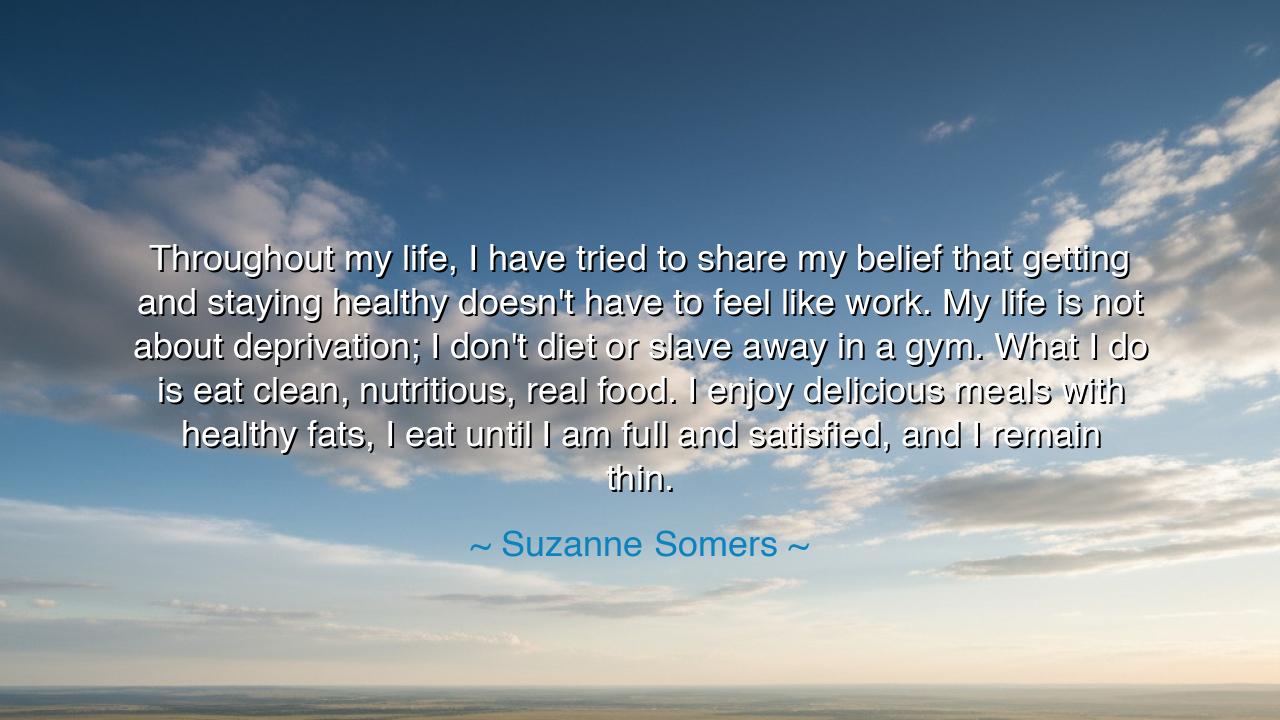
Throughout my life, I have tried to share my belief that getting
Throughout my life, I have tried to share my belief that getting and staying healthy doesn't have to feel like work. My life is not about deprivation; I don't diet or slave away in a gym. What I do is eat clean, nutritious, real food. I enjoy delicious meals with healthy fats, I eat until I am full and satisfied, and I remain thin.






In the words of Suzanne Somers, a woman who turned both beauty and wisdom into a lifelong art, we find a truth that transcends the passing trends of health and vanity: “Throughout my life, I have tried to share my belief that getting and staying healthy doesn’t have to feel like work. My life is not about deprivation; I don’t diet or slave away in a gym. What I do is eat clean, nutritious, real food. I enjoy delicious meals with healthy fats, I eat until I am full and satisfied, and I remain thin.” Beneath these gentle words lies a philosophy as ancient as the earth itself — the belief that harmony, not hardship, is the foundation of lasting well-being.
In this teaching, Somers echoes the wisdom of the ancients, who knew that the body and soul must live in balance. The Greeks spoke of eudaimonia — the flourishing of life through virtue and moderation. The sages of the East called it the Middle Way, a path between indulgence and austerity. Somers, in her own modern voice, calls us back to that sacred center. She reminds us that health is not born of deprivation or punishment, but of alignment — of honoring the body as a friend rather than treating it as an enemy to be subdued.
The origin of her insight lies not in privilege, but in experience and endurance. Suzanne Somers faced illness, aging, and public scrutiny, yet she refused to bow to despair or vanity. She sought not to fight her body, but to listen to it — to nourish it with what is real and alive. In this, she discovered a truth often forgotten in the clamor of diets and regimens: that the human body, when treated with respect and love, will find its own equilibrium. It is not discipline alone that sustains health, but joy — the joy of movement, of flavor, of living fully.
Her philosophy finds kinship with the practices of Hippocrates, the father of medicine, who said, “Let food be thy medicine, and medicine be thy food.” He taught that the path to vitality lay not in extremes, but in the simplicity of whole, natural nourishment. The ancient healers knew that health was a rhythm — a song sung between the body and the earth. Somers, too, lives by this rhythm: eating from the garden of nature, not the factory of man; finding satisfaction not in excess, but in wholeness. Her words, though spoken in the age of modern convenience, awaken that old remembrance — that to live well is to live close to life itself.
Her rejection of the word “diet” carries deeper meaning. In our time, the word has become a chain — a symbol of suffering, denial, and guilt. But to the ancients, diaita (the Greek root of “diet”) meant a way of living. Somers reclaims that ancient spirit. She does not count, restrict, or punish; she lives by a way — a way that honors appetite without surrendering to excess, that delights in nourishment without worshiping vanity. This is not laziness, but wisdom: the understanding that health is not conquered through battle, but cultivated through harmony.
And yet, her teaching carries a quiet heroism. In a world that glorifies exhaustion and celebrates struggle, it is an act of courage to say, “It doesn’t have to feel like work.” To live well with grace — to be both strong and content — is no small feat. Like a philosopher among warriors, Somers teaches that ease is not weakness, but mastery. The one who can live joyfully, without fear or guilt, has achieved what even the ascetics could not: freedom within the flesh.
Let this then be the lesson for those who seek health and peace: do not chase the quick fix, nor chain yourself to regimes that steal your joy. Eat as nature intended — foods that grow, that breathe, that nourish. Move as the body was made to move, not in punishment, but in gratitude. Seek not the thinness of appearance, but the lightness of being. For the true secret of health lies not in suffering, but in serenity; not in restriction, but in reverence. When you eat with mindfulness, when you live with balance, the body becomes not a burden to manage, but a temple of energy and grace. Thus, as Suzanne Somers teaches, the art of health is not to labor, but to live beautifully — every meal, every motion, every moment, in harmony with life itself.






AAdministratorAdministrator
Welcome, honored guests. Please leave a comment, we will respond soon